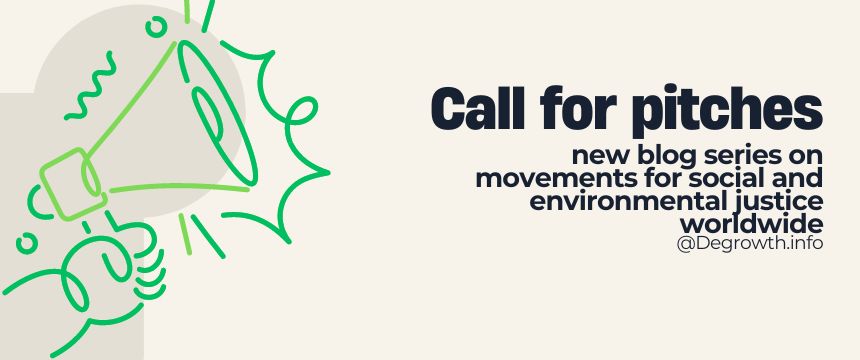The first International Degrowth Conference held in Paris in 2008 was followed by another ten other conferences, most of which took place in Europe. These conferences provided room for the Degrowth community to meet and exchange on latest research. In Christiana Town (Copenhagen) in 2018, just before the 6th International Degrowth Conference in Malmö, degrowthers met in a new format. Going beyond research-related conversations, they instead discussed the “how” of Degrowth and started to organise the movement. This was the first Degrowth Movement Assembly (for more information on the conversations at the Assemblies see Asara 2022). It welcomed about 70 participants representing around 40 different Degrowth collectives who agreed to become part of the same Degrowth network and formally created several international working groups. Amongst others, a communication group (degrowth.info), an activist group which organises the Global Degrowth Day every year, a narrative group, a research group and a mapping group were created. Under rather loose terms, the Degrowth network was born.
In the subsequent Degrowth Assemblies, in the Hague in 2021 (online) and in Vienna in 2022, further discussions were held on how to grant greater and better structure to the network. Both times, the need for some coordination body was clearly stated, and the possibility of a “Degrowth International” was mentioned. Despite the existence of a network, the international Degrowth movement has indeed no official name, nor an official representation, and there is no formal way to take democratic decisions on its behalf. If no special attention is given to inclusivity, pluralism and representation, the risk is to reproduce existing patriarchal and colonial power structures within the very movement that claims to oppose them. Communication within the Degrowth network also remains poor, with some international working groups becoming inactive and others being created without the network being notified. This lack of communication structure means degrowthers’ energy is not spared, as similar tasks are undertaken multiple times in different contexts (see Rilović et al. 2022 for a more extensive reflection on this topic).
The matter is complex to solve, especially within the day-long meeting format that the Assemblies have had so far. In an attempt to address these questions seriously and properly, the latest assembly in Vienna mandated a volunteer group that was yet to be formed: the open collective Organising the Degrowth Network (ODN). ODN is a working group whose major goal is, within a year, to prepare a proposal for restructuring the Degrowth network and its functioning - composition and functions of the assembly and coordination group, methodology, nomination and election, name etc.The open collective’s proposal will be discussed and approved, amended or rejected at the next movement’s assembly (Zagreb International Degrowth Pre-conference on August 28th 2023 – detailed programme and location will be announced later). ODN can thus be compared to a constituent assembly for the future of the Degrowth movement.
The mandate of the open collective ODN includes further tasks. In summary, ODN must:
At its creation in late summer 2022, any Degrowth actor willing to volunteer some of their time was welcome to join the open collective ODN. A group was created, composed of:
So far, ODN has been contacting the different nodes, or international working groups, of the Degrowth Network, in an attempt to identify which are active and in what ways, which are inactive, which have been newly created, and most importantly, what they expect from a restructuring of the network. Because it is considering shaping its proposal around sociocratic principles, ODN is working on organising a training on sociocracy that will be recorded and made publicly available.
ODN also started structuring its work for the delicate task of proposing a democratic structure that would improve the network without making it rigid or complex to manage. No content-related discussions have been had yet, but a few things are already clear. ODN’s proposal will not revolutionise the Degrowth network; rather it will formalise existing instances. Formal power delegation and structure are seen positively as a way to avoid power abuse and to reflect inclusive and democratic ideals of Degrowth (see Rilović et al. 2022). A coordination group, as suggested in the Hague and Vienna Assemblies, will most likely be created, along with a method for choosing the people part of this group. Together with a better-defined structure for the network, this will help to empower the movement itself and its members. The boundaries of the Assembly and its attendants will also be defined. Numerous internal processes will finally be improved: communication within the network and information exchange, coordination for actions and campaigns, collaborations with other movements, funding allocation, visibility of each working group, etc.
Any degrowther external to the open collective is warmly invited to contribute to the ODN task. Please get in touch with us to share your worries and ideas, especially if you represent a newly created international working group that has not yet been contacted. Just send an email to our two coordinators Noémie and Jean (noemie.cadiou.18@alumni.ucl.ac.uk and jean.aillon@gmail.com). We are looking forward to dicussions!
If you found this article meaningful and want to support the work we do at degrowth.info to make this platform possible, please become a supporting member for a few euros a month!

Degrowth.info is launching a call for blog posts that will constitute a series on movements for social and environmental justice, with a focus on Global South struggles and organising. Do you have a story to contribute?

In October of this year Giorgos Kallis, Julia Steinberger and Jason Hickel were awarded 9.9 million euros by the European Research Council (ERC) for a project titled Pathways towards post growth deals. This constitutes the largest ever sum of funding for a degrowth research project! We interviewed Giorgos Kallis to find out more about this important milestone!

After decades of research, the time has come: degrowth now has its own journal.